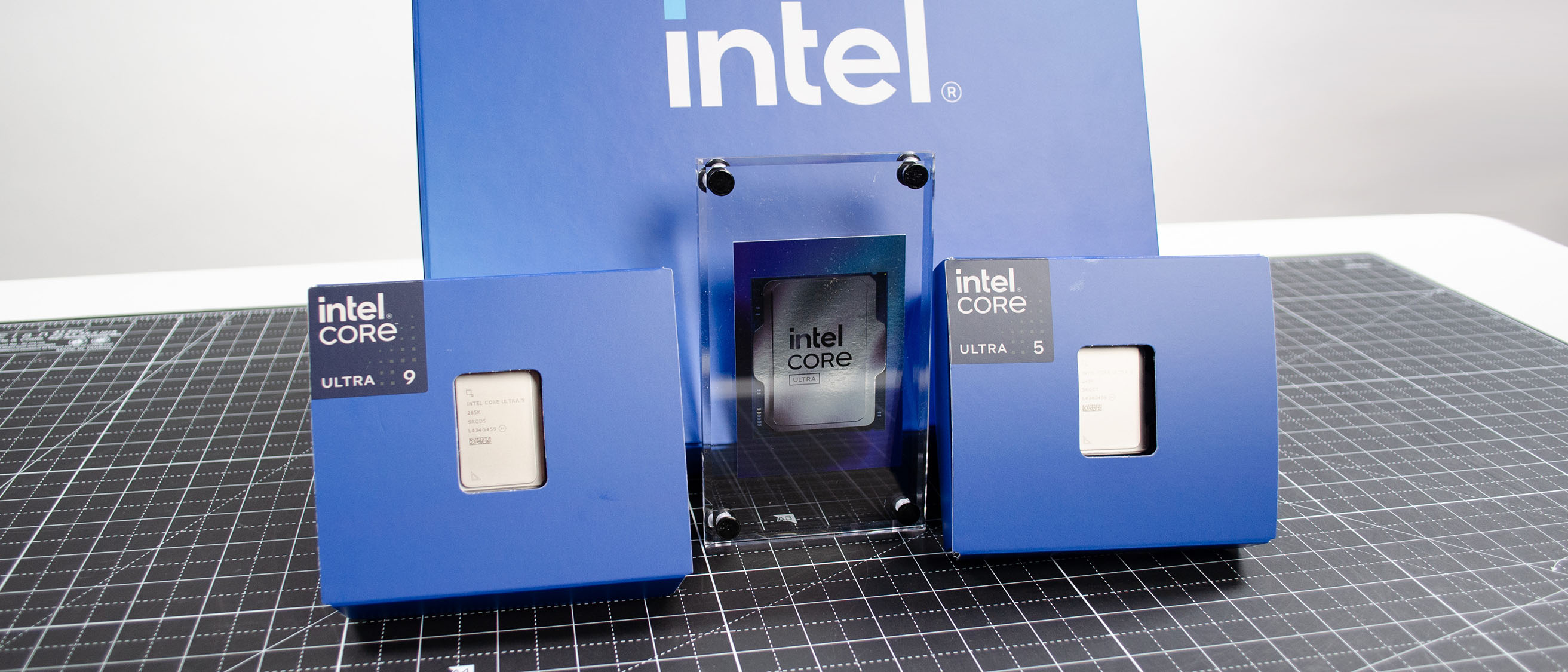TechRadar Verdict
I had high hopes for Arrow Lake, and of the two current-gen processor lines, it beats out archrival AMD's Ryzen 9000 series, which is a positive. However, the new Intel Core Ultra 9 285K and Intel Core Ultra 5 245K really aren't any better than the chips they are replacing, and their efficiency gains are too modest to justify investing in a whole new platform.
Pros
- +
Strong performance vs AMD Ryzen 9000-series
- +
Improved efficiency
- +
First Intel desktop with an NPU
Cons
- -
Worse gaming performance vs Raptor Lake Refresh
- -
Expensive to upgrade
- -
NPU is kinda pointless
Why you can trust TechRadar
Intel Core Ultra 9 285K & Intel Core Ultra 5 245K: One-minute review
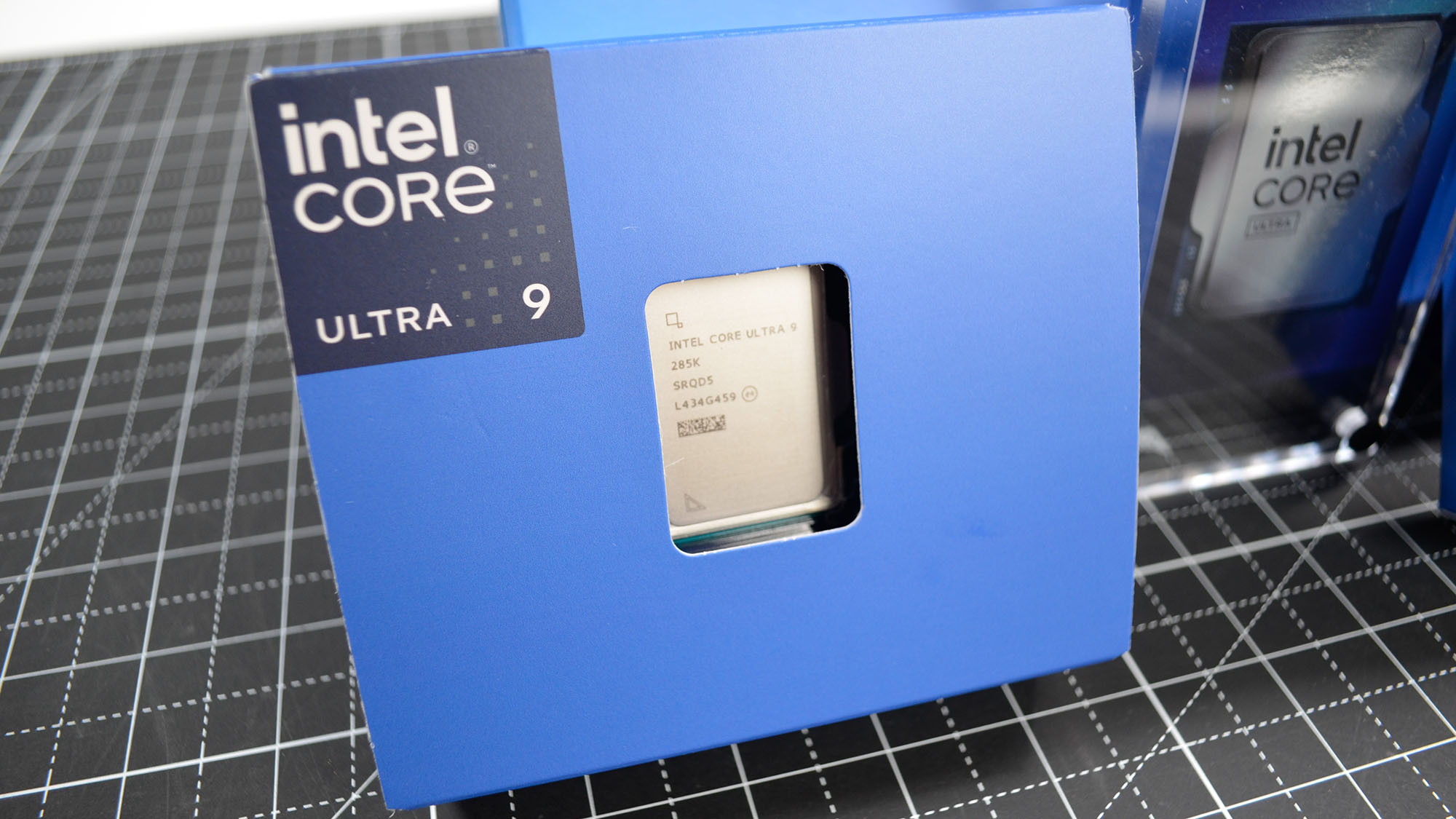
I've had a couple of pre-briefings with Intel over the past couple of months about Intel Arrow Lake, so I can't say I'm surprised by the Intel Core Ultra 9 285K and Intel Core Ultra 5 245K, but it doesn't mean enthusiasts are going to be any less disappointed with what we got in the end.
Both Core Ultra chips effectively match the performance of the chips they are replacing, and while I've been saying for a while now that we have to stop looking at performance as the only metric that matters, the efficiency gains offered by these chips are not substantial enough to really merit the investment if you're rocking a 13th-gen Intel chip or better.
The new chips do come with some architecture changes worthy of note, though, and they aren’t all useless for consumers. For starters, the chips come equipped with an NPU, the first Intel desktops to do so, and the new Intel Arc integrated GPU offers some improved graphics capabilities that will make a real difference for some AIO (all-in-one) PCs.
However, these are largely going to be unnecessary for just about any gamer or content creator out there since most desktops are going to have a discrete graphics card that will run AI circles around the NPU in these chips, and make the Intel Arc iGPU pretty much a non-factor in anything other than the most budget gaming PC from a couple of years ago.
For some folks, unfortunately, Intel Arrow Lake misses the target they wanted it to hit, and with strong competition from AMD’s Ryzen 9000-series, these aren't the best processors for gaming or content creation. But, Intel has to start somewhere as it shifts to a new platform, and it managed to produce a very different kind of chip over its predecessors without giving up too much on the performance front, which is no easy feat.
Ultimately, they're perfectly fine chips if you're buying them in a prebuilt PC or if you're coming in from 11th-gen Intel or older (or making the move from AMD), since you'll have to buy all-new kit anyway, so you might as well set yourself up for Nova Lake next year. But anyone with a Raptor Lake chip isn't going to see any real benefit from these, so they're better off waiting for Nova Lake in 2025 to make the jump.
Intel Core Ultra 9 285K & Intel Core Ultra 5 245K: Price & availability
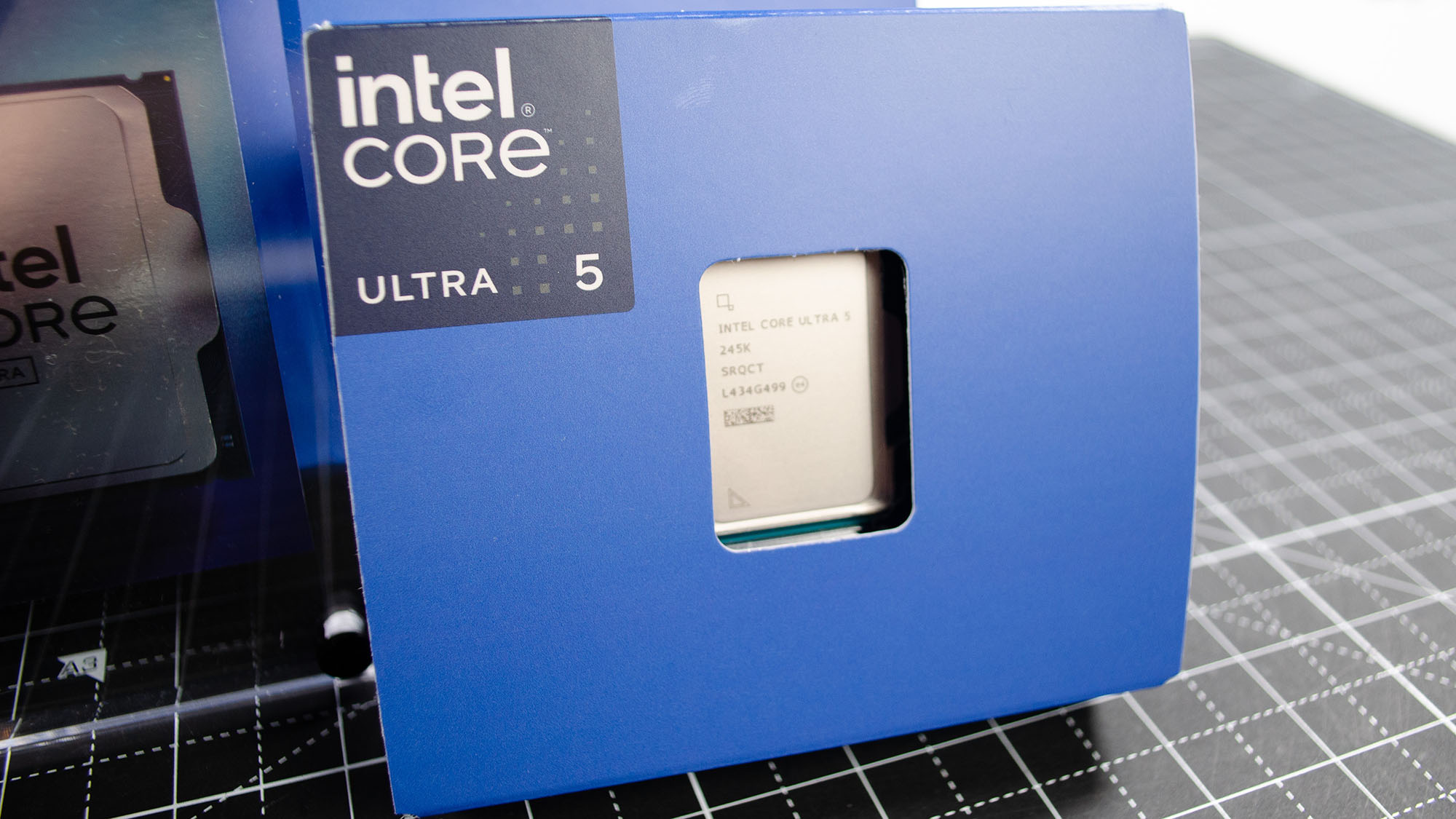
The Intel Core Ultra 9 285K and Intel Core Ultra 5 245K are available now in the US, UK, and Australia, priced at $589 / £548.99 / AU$1,099 and $309 / £289.99 / AU$589, respectively.
While the prices for these two chips stay the same or come in slightly lower than their predecessors, which is good, there are a bunch of added costs to upgrade to these chips... which is bad. First, they require an LGA 1851 chipset, so you’re going to have to buy a new motherboard in order to use them. They also don’t support DDR4 RAM, so you’re likely going to have to buy new DDR5 RAM as well.
The LGA 1851 socket does take the same CPU coolers as an LGA 1700 socket, though, so if you have a 12th-gen or better processor, at least your cooler will fit.
Against AMD’s latest, the Core Ultra 9 285K is better priced than AMD’s flagship Ryzen 9 9950X, but more expensive than the Ryzen 9 9900X. The Core Ultra 5 245K is slightly more expensive than AMD’s competing Ryzen 5 9600X.
- Value: 3 / 5
Intel Core Ultra 9 285K & Intel Core Ultra 5 245K: Specs
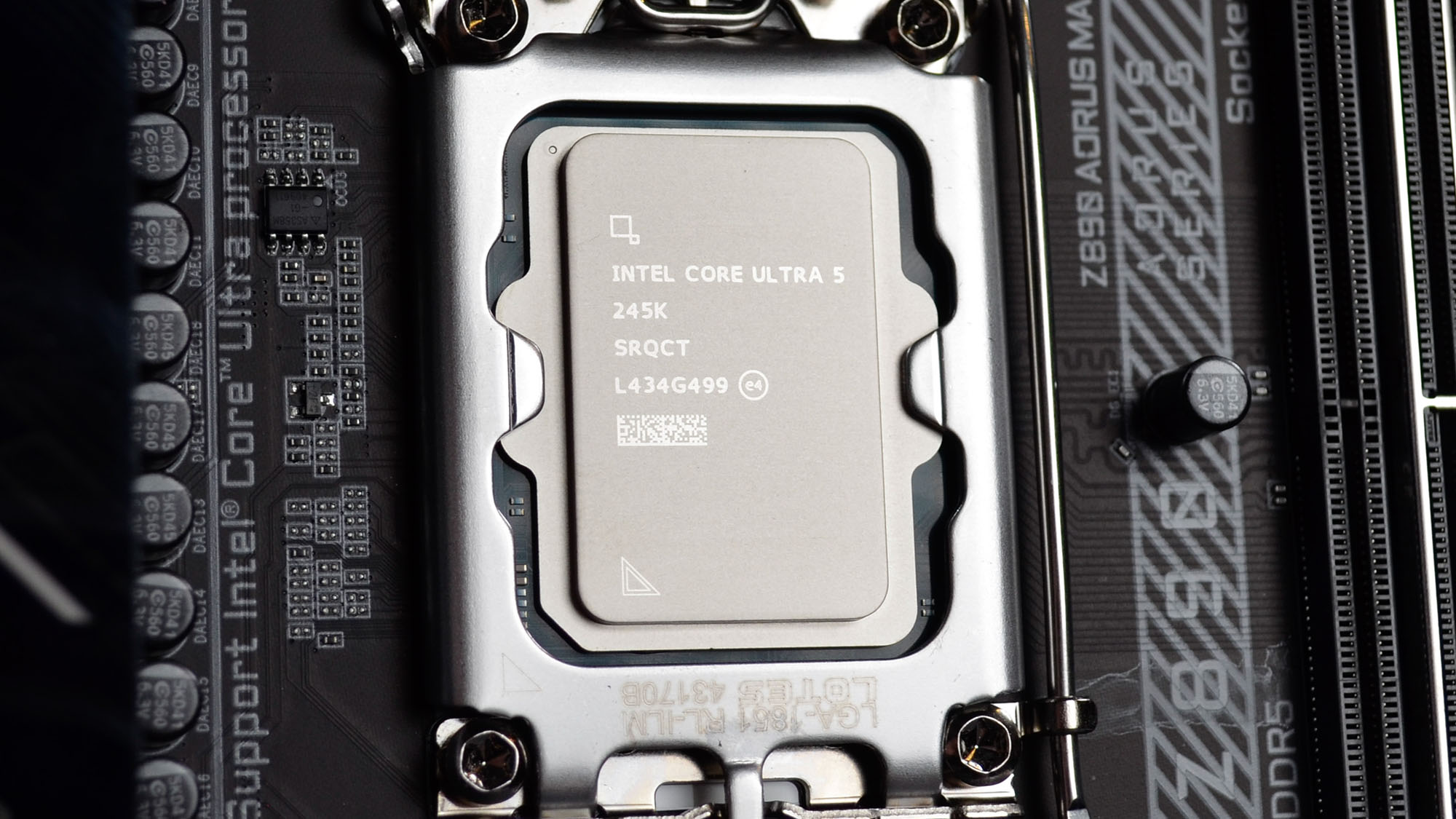
| Header Cell - Column 0 | Intel Core Ultra 9 285K | Intel Core Ultra 5 245K |
|---|---|---|
| Price | $589 / £548.99 / AU$1,099 | $309 / £289.99 / AU$589 |
| Core Count | 8P + 16E | 6P + 8E |
| Thread Count | 24 | 14 |
| E-Core Base Clock | 3.2GHz | 3.6GHz |
| E-Core Boost Clock | 4.6GHz | 4.6GHz |
| P-Core Base Clock | 3.7GHz | 3.6GHz |
| P-Core Boost Clock | 5.7GHz | 4.6GHz |
| L3 Cache | 40MB | 24MB |
| TDP | 125W | 125W |
Intel Core Ultra 9 285K & Intel Core Ultra 5 245K: Chipset & features
The Intel Core Ultra 9 285K and Intel Core Ultra 5 245K are newly architected desktop processors, powered by the same Lion Cove P-cores and Skymont E-cores found in the Intel Meteor Lake chips released late last year for laptops.
Intel Arrow Lake is essentially Intel Meteor Lake for desktops, and so it also features the same Intel NPU 3 13 TOPS neural processor as Meteor Lake, and the same Intel Arc Alchemist integrated GPU with four Xe cores (including four ray tracing cores) as its laptop cousin.
The max clock speeds of the Core Ultra 9 285K and Core Ultra 5 245K are slightly lower on performance cores (though with a higher base frequency) and higher across the board on the efficiency cores over the Core i9-14900K and Core i5-14600K, respectively.
The maximum amount of RAM is unchanged at 192GB, though the Core Ultra chips do not support DDR4 RAM, but they can support faster DDR5 memory up to 6,400MT/s.
Other than that, the TDP of the two Core Ultra chips is essentially unchanged from the 14th-gen chips they’re replacing, but they do have a 5°C higher TjMax (Tjunction max, which is the maximum thermal junction temperature that a processor can hit before it lowers performance to prevent overheating), so the chips won’t start to throttle until they hit 105°C.
- Features: 3.5 / 5
Intel Core Ultra 9 285K & Intel Core Ultra 5 245K: Performance
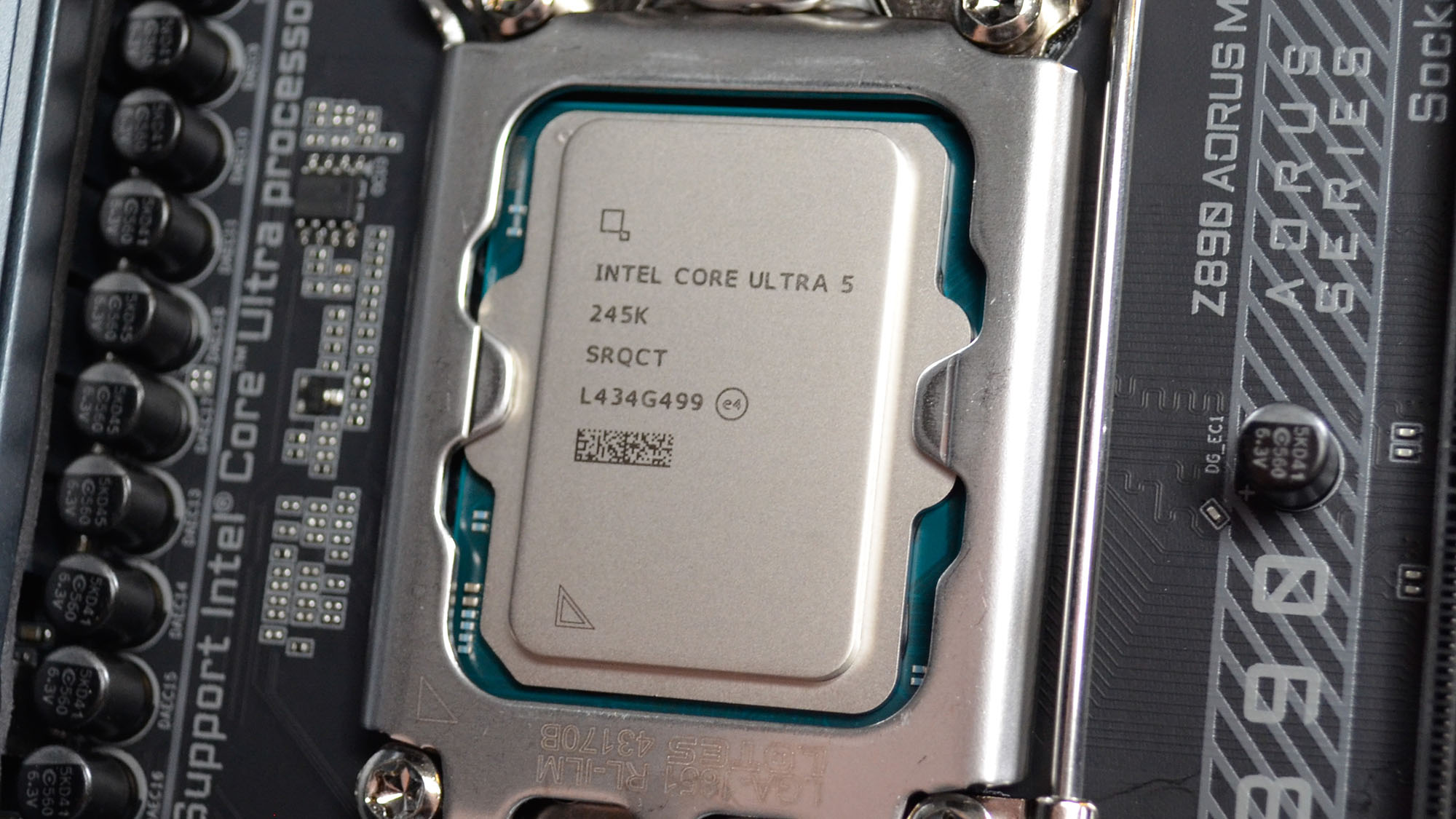
Well, we’ve finally come to the performance segment of the review, and I wish I had better news for you, but most of you will be disappointed.
Starting with synthetic performance, the Core Ultra 9 285K is a very mixed bag vis-a-vis the Core i9-14900K and AMD Ryzen 9 9950X and Ryzen 9 9900X.
In some tests like Geekbench 6.2, the Core Ultra 9 outperforms the 14900K in single-core performance by about 8%, only to lose out by about the same in Cinebench R23’s single-core benchmark. Meanwhile, in Cinebench R23’s multi-core performance, the Core Ultra 9 285K comes in about 12% faster than the 14900K and is essentially tied with the AMD Ryzen 9 9950X.
The Core Ultra 5 245K, meanwhile, is effectively even with the Core i5-14600K, but fares much better in PCMark 10’s Home CPU benchmark, showing a roughly 14.5% performance boost over the 14600K and a 5.6% better showing than the AMD Ryzen 5 9600X.
In terms of average creative performance, the Core Ultra 9 285K does slightly better than the 14900K but slightly worse than the Ryzen 9 9950X — it’s substantially better than the Ryzen 9 9900X, on average, however.
The Core Ultra 5 245K, meanwhile does slightly worse, on average, than the Core i5-14600K, but comes out nearly 23% better on average than the Ryzen 5 9600X.
The gaming performance of the Core Ultra chips was easily the biggest disappointment, however, and is where these two chips really falter against Raptor Lake Refresh.
The Core Ultra 9 285K came in about 14% slower in gaming performance than the Core i9-14900K (though about 7-8% better than the Ryzen 9 9950X and Ryzen 9 9900X).
The Core Ultra 5 245K, meanwhile, came in about 9% slower than the i5-14600K, and only about 4% faster than the Ryzen 5 9600X.
Needless to say, if you’re looking for the best processor for gaming, you’ll want to look at the AMD Ryzen 7 7800X3D or wait to see what the upcoming AMD Ryzen 7 9800X3D does later this year.
When all the scores are tabulated and the final averages calculated, the Core Ultra 9 285K shows slightly better multi-core performance, slightly lower single-core performance, slightly better creative performance, and much worse gaming performance against its predecessor.
The Core Ultra 5 245K is generally slower for just about everything compared to the Core i5-14600K, though it does have much better productivity performance, so this will make a great chip for affordable AIO PCs without discrete graphics.
The real disappointment with Arrow Lake, though, lies with its energy efficiency... or lack thereof. Most people don’t even need the performance of the Intel Core i9-14900K or even the Intel Core i5-14600K, so I’d be fine with lower performance if it meant that there was much less power draw, but the Core Ultra 9 285K and Core Ultra 5 245K max out at 90.5% and 93.3% of the power of their predecessors, respectively.
That’s still much too high, and at that point, you might as well just stick with Raptor Lake Refresh and undervolt the CPU.
Ultimately, given the significantly higher cost of making the switch to these processors from the LGA 1700 chips, the performance and efficiency just don’t make these compelling purchases on their own.
If you’re shopping for the best prebuilt gaming PC though, though, I won’t be too worried about picking between one with a 14th-gen chip or these new Core Ultras. You’re not going to notice the difference.
- Performance: 3.5 / 5
Intel Core Ultra 9 285K & Intel Core Ultra 5 245K: Should you buy it?
| Header Cell - Column 0 | Notes | Score |
|---|---|---|
| Value | Given the cost associated with the upgrade to these chips, it's only worth it if you're on an 11th-gen Intel chip or older, or switching over from AMD and want something you can upgrade down the road. | 3 / 5 |
| Features | The NPU and integrated Intel Arc GPU are good, especially for affordable AIO PCs, but there's not enough here to really help it stand out from the previous generation. | 3.5 / 5 |
| Performance | The performance of these two chips are something of a mixed bag when compared to their predecessors and competitors, but they are still some of the best performing chips on the market. | 3.5 / 5 |
| Final Score | The Intel Core Ultra 9 285K and Core Ultra 5 245K are decent enough processors, but they lack a real wow factor to them that make it hard to recommend to anyone with a 12th-gen Intel or better. | 3.34 / 5 |
Buy the Intel Core Ultra 9 285K or Intel Core Ultra 5 245K if...
If you haven't made the leap to the latest Intel processors, you're going to have to buy all new stuff anyway, so you might as well go for these chips and future-proof your PC for Nova Lake next year.
While the efficiency gains on these two chips aren't huge, they are more efficient, which is definitely a good thing.
Don't buy them if...
Running these chips is going to require a new motherboard at least, and likely will require you to buy new RAM as well, making these chips a substantial investment.
While the performance of these chips is great in absolute terms, they aren't any better than their predecessors, though substantially worse for gaming.
Intel Core Ultra 9 285K & Intel Core Ultra 5 245K: Also Consider
The Intel Core i7-14700K is still my pick for the best processor for most people thanks to its strong performance and accessible pricing.
Read the full Intel Core i7-14700K review
If you're looking for the best processor for gaming, then this is the processor you need to buy, at least until its successor come out.
Read the full AMD Ryzen 7 7800X3D review
How I tested the Intel Core Ultra 9 285K and Intel Core Ultra 5 245K
When I test processors, I put them through a rigorous process that takes into account synthetic benchmarks, creative workloads, gaming performance, and more to arrive at my scores.
I use industry standard tools like Geekbench, Cinebench, and PCMark, as well as creative apps like Adobe Photoshop, Blender, and Handbrake.
For gaming, I use built-in benchmarks for CPU-intensive games like Total War: Warhammer III on low graphics settings at 1080p to better isolate a CPU's impact on the game's framerates.
Finally, I make sure to use the same system for common-socket processors, the fastest RAM and SSD, and the most powerful GPU and motherboards available to maintain consistency wherever possible to ensure that CPU scores are comparable.
With each new processor I review, I retest previous processors I've reviewed in order to get updated scores for each, after installing the latest system and BIOS updates.
I've tested and retested two generations of processors more times than I can count over the last couple of years, so I am intimately familiar with how these chips perform, and my deep computer science and journalism background allows me to put all of this testing data into its proper context for consumers so they can make the right choice when shopping for a new processor.
- Originally reviewed October 2024

John (He/Him) is the Components Editor here at TechRadar and he is also a programmer, gamer, activist, and Brooklyn College alum currently living in Brooklyn, NY.
Named by the CTA as a CES 2020 Media Trailblazer for his science and technology reporting, John specializes in all areas of computer science, including industry news, hardware reviews, PC gaming, as well as general science writing and the social impact of the tech industry.
You can find him online on Bluesky @johnloeffler.bsky.social
